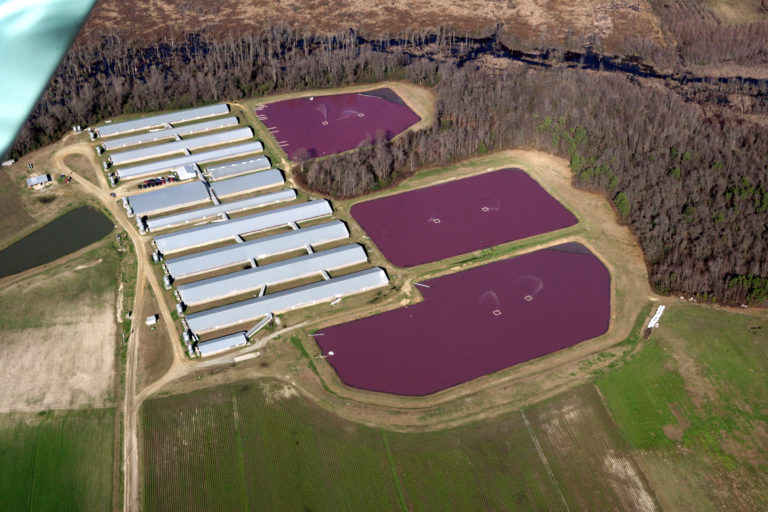“Biogas” Won’t Lead to a Cleaner, Greener North Carolina
By: Kemp Burdette

By Kemp Burdette, the Cape Fear Riverkeeper at Cape Fear River Watch
Smithfield Foods, a $15 billion company, has a plan to profit from hog waste.
That plan would give it cover to keep its antiquated, polluting, system of storing waste from roughly 9 million North Carolina hogs, a system that puts our soil, our air, and our water at risk.
Currently, Smithfield’s contractors store the nearly 10 billion gallons of hog waste the company’s hogs produce each year in giant, unlined cesspools, then spray it on nearby cropland.
Pathogens from that waste can travel through our porous soils and pollute our water; droplets from the waste drift into neighbors’ homes; excess nitrogen and phosphorus from the waste seep into our creeks, streams, and rivers, where they can cause toxic algal blooms and dead zones.
Smithfield plans to cover the cesspools at some of the North Carolina hog operations that raise its pigs, capture the gas that’s emitted from the rotting manure and waste, and pipe the gas, which it’s calling biogas, to utility-owned refineries.
One of its planned plants, the “Grady Road Project,” which was slated to begin construction last month, will build 30 miles of pipeline to collect gas from 19 hog operations owned by Smithfield and its contractors in Duplin and Sampson counties, then ship it to a processing plant, according to the Charlotte Business Journal.
Smithfield’s energy subsidiary, Smithfield Renewables, plans to begin producing gas at the plant by late summer and be at full capacity by the end of the year.
The company and its partner, Align, are eyeing an even larger project when Grady Road is complete, involving 30 farms.
“But it won’t lead to a cleaner, greener, North Carolina. Instead, the company’s plans could make some of our problems even worse.”
Capturing some of the gas from hog waste cesspools won’t solve the pollution problems this primitive waste management method creates. It will also result in a crisscrossing network of pipelines carrying gas across rural communities.
Most of the cesspools that hold those 10 billion gallons of hog waste produced each year are unlined. Under Smithfield’s plan, they’d stay unlined. That means our groundwater will still be at risk.
The covers will trap the ammonia — a gaseous form of nitrogen — that’s emitted by the hog waste. That trapped ammonia means the nitrogen concentration of the waste in those cesspools will be even greater. The waste will still be sprayed on nearby cropland. Droplets of waste can still blow into neighbors’ homes, as well as our rivers.
That means our air and our surface water will still be at risk.
And the increased concentration of nitrogen could make the risk to our waters even greater than it was before.
Even the rank smell will persist; since fans at hog operations blow the stench out of the crowded hog barns and spraying the waste also spreads the stink of hog waste.
Smithfield sees dollars in hog waste. And its biogas plan may well add to the company’s bottom line.
But it won’t lead to a cleaner, greener, North Carolina. Instead, the company’s plans could make some of our problems even worse.
Smithfield can afford to invest in solving the pollution problems its business has caused on the coastal plain. Instead, it’s simply trying to wring more profit from us.